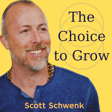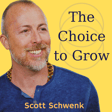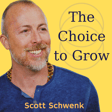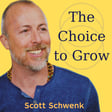
Tracee Stanley on Authenticity, Power and Practice
In this deep and luminous conversation, Scott Schwenk welcomes yoga nidra teacher, author, and spiritual guide Tracee Stanley for a heartfelt dialogue on what it means to grow—not by force, but by surrender. From samskaras (stored subtle energies that shape a person's personality, perspective and motivations) and sacred pauses to the profound practice of remembering, Tracee shares tools and stories to help us soften into life’s transitions and reawaken our innate worth. A conversation rich in wisdom, practice, and radical presence.
Tracee Stanley - Spiritual teacher, guide, mentor, author
Tracee Stanley is the author of the bestselling book Radiant Rest: Yoga Nidra for Deep Relaxation and Awakened Clarity and The Luminous Self: Sacred Yogic Practices & Rituals to Remember Who You Are (Shambhala Publications) and a forthcoming book Living Ritual (Sounds True). Tracee is the founder of Empowered Life Circle, a sacred community and portal of practices, rituals, and Tantric teachings inspired by more than 28 years of studentship in Sri Vidya Tantra and the teachings of the Himalayan Masters. As a post-lineage teacher, Tracee is devoted to sharing the wisdom of yoga nidra, rest, meditation, self-inquiry, nature as a teacher, and ancestor reverence. Tracee holds certificates from Pacifica Graduate Institute in Advanced Eco-Therapy, New Thinking, Best Practices, and Emerging Modalities and a certificate in Advanced Ecopsychology. Tracee is gifted in illuminating the magic and power found in liminal space and weaving devotion and practice into daily life. Learn more at traceestanley.com.
Scott Schwenk - Master coach, spiritual teacher, culture architect
Scott Schwenk’s teachings, courses and private mentoring guide leaders, seekers and creatives to explore their deepest selves in service of thriving on all levels of being, both individually and relationally.
Host and creator of the podcast The Choice To Grow, Scott is known for his hugely popular courses and workshops with OneCommune.com, Younity.com, Wanderlust Festivals, and Unplug Meditation, Scott has been catalyzing the inner evolution of others for decades: helping them to grow, transform obstacles into opportunities, and find Love within.
Scott spent several years living and studying in a meditation monastery which introduced him to the core body of Tantric meditation traditions which continue to flow through each of his teachings. Scott continues to study and teach from two key Tantric lineage streams.
Apprenticeships in leadership development, meditation and philosophy training, shadow work/shadow resolution and spiritual awakening are all part of Scott’s development into the thought-leader that he is today. He continues to refine his offerings studying and practicing with key innovators at the leading edges of human development.
Scott’s teachings support the entire person to not only progressively recognize, stabilize and embody our inextricable oneness with the source of creation (Waking Up), but also to resolve the wounds of the past (Cleaning Up), continually expand our capacities for wider and more inclusive perspectives on any moment (Growing Up) and creatively and joyfully participate and collaborate with all of life as a loving thriving human being (Showing Up).
You can explore Scott’s courses, workshops, retreats, training and master coaching at https://scottschwenk.com and can find him on Instagram @thescottschwenk.
"Scott Schwenk is a deeply skilled teacher and healer, with a rare and authentic gift for helping people create positive inner change in their lives."
~Sally Kempton (aka Swami Durgananda),
Master meditation teacher and author of Meditation for the Love of It and Awakening Shakti.



